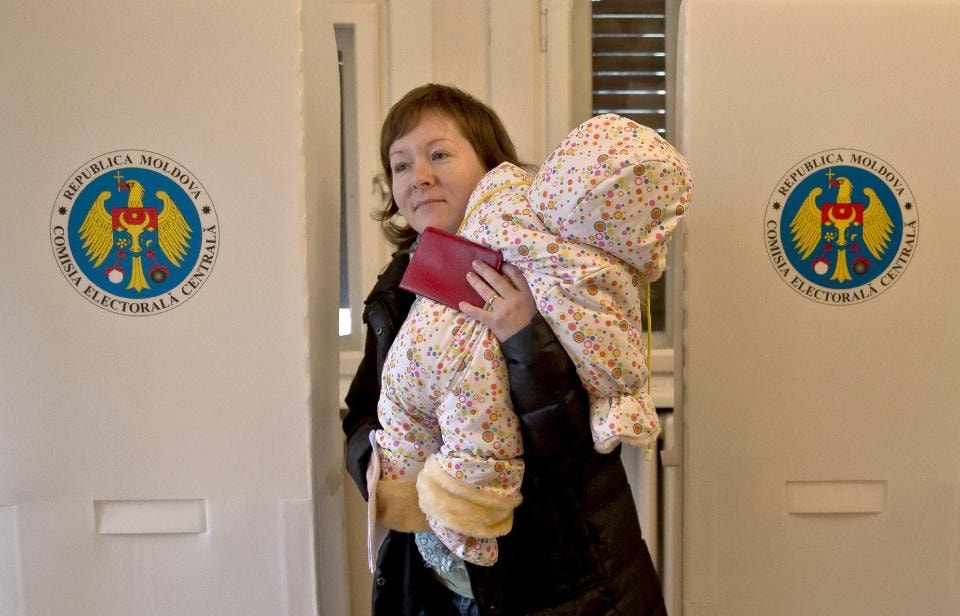Elections in Moldova - slow steps "Westward"
(Baonghean) - Although it is a small country located between Ukraine and Romania with a population of only 3.6 million people, the parliamentary election in Moldova last weekend became the focus of international media because of the re-enactment of the East-West tug-of-war as happened in Ukraine. And according to the newly announced preliminary results, the advantage is leaning towards pro-European parties. However, like Ukraine, Moldova's "Westward march" is not easy when pro-Russian parties also won a high number of votes to join the ruling coalition.
 |
| A Moldovan citizen goes to vote. Photo: Ap |
CThere were 25 political parties participating in the election, but in essence, this was a race between two political blocs, one supporting Russia and the other being pro-Europe. According to preliminary results with more than 85% of the votes counted, the European-oriented coalition, including the Liberal Democratic Party, the Democratic Party and the Liberal Party, received 44.4% of the votes. The two pro-Russian parties, the Socialist Party and the New Communist Party, received a total of 39.5%. However, in terms of the number of votes each party won, the Socialist Party led the election with 21.6% of the votes. According to experts' forecasts, this situation is unlikely to change after all the votes are counted. That is, the Socialist Party and the pro-Russian Communist Party are unlikely to win enough seats in the National Assembly to form a coalition. Therefore, Moldova's future ruling coalition will likely include 3 pro-European parties and 1 of the 2 parties advocating closer to Russia. Considering the Communist Party's line of being pro-Russian, but also not denying European integration, the possibility of this party being present in the alliance is very high.
The parliamentary elections in Moldova have attracted special attention from the world public opinion because they are considered a new “battlefield” between Europe and Russia, where people are waiting to see whether Russia can “stop the Westward advance” of this small country not by intervention measures like with Ukraine, but by an official election result. Currently, Moldova is also divided on whether to follow the European Union or Russia, and in what form to cooperate with these two partners. Currently, both the President, the ruling party and the two coalition parties have a pro-European stance with the desire for Moldova to become a candidate to join the European Union in 2017, then become a full member in 2020.
The current ruling coalition has laid the foundations for relations with Europe quite systematically: joining the Schengen area in April and signing an association agreement with the European Union at the end of June. By September, a free trade area with the EU had been established. However, unlike Ukraine, the pro-Russian faction in Moldova still has a strong voice in politics, not only in the breakaway region of Tran-Dniester. According to a survey right before the election, the pro-Russian faction is quite close to the pro-European faction in terms of votes. In terms of individual parties, the two leading parties are the Socialist and Liberal Democrats, which have opposite views on foreign policy, especially with Russia. And that reflects quite accurately the current situation in Moldova, which is a balanced struggle between two forces facing the East and the West.
This balance of power is reflected once again in the preliminary results announced by the Moldovan Election Commission. The pro-European camp has won, but the pro-Russian camp is also close behind, and will almost certainly be represented in the ruling coalition. However, with the shadow of the pro-Russian crisis in Ukraine lingering, people are worried about which path is right for Moldova. Because without a proper foreign policy, Moldova will not be able to integrate into Europe without paying the price of internal instability – a fact that is also present in neighboring Ukraine. This doubt is well-founded because currently, under the leadership of the pro-European ruling coalition, Moldova remains one of the poorest countries in Europe. According to the results of a recent poll, more than 85% of the people questioned are dissatisfied with policies on wages, pensions and employment. This is an opportunity for any pro-Russian party that joins the ruling coalition to increase its voice, which means slowing down the process of European integration.
Thus, the image of Moldova now is the image of a miniature Ukraine. With Moldova's strategic location, Russia still wants to maintain its military presence in Tran-Dniester and prevent Moldova from linking with the West. Meanwhile, the European Union is always keeping an eye on Moldova to avoid the pro-Russian wave spreading to the former Soviet republics and the Balkan countries. With Moldova being so small and divided in its foreign policy, many have predicted a not-so-optimistic scenario for this country, which is to become a new "battlefield" for the East-West struggle, as commented by analyst Oazu Nantoi in Moldova: "This is not a competition between parties but a competition to determine who will influence Moldova from the outside. Moscow or Brussels?"
Thuy Ngoc
